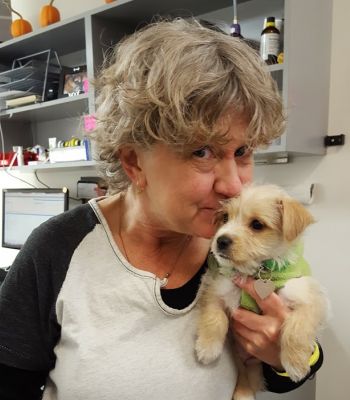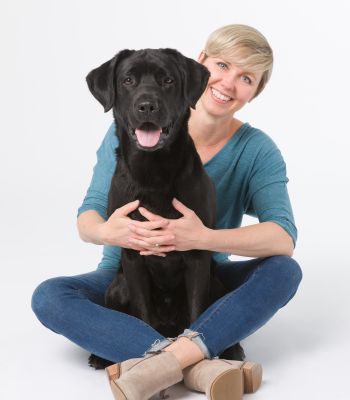Pain & Osteoarthritis Lecture Series

November 16, 2019 Saturday, 9:00 AM - 4:00 PM
Join the WSAVT for a pain and osteoarthritis lecture series on Nov 16th, 2019 at the Eagles Nest in Bremerton, WA.
Obtain 5 hours of VBOG and WSAVT approved CE.

Donna Sisak LVT, VTS (Anesthesia)
In 2006, Donna became a member of the Academy of Veterinary Anesthetists by passing the NAVTA CVTS (National Association of Veterinary Technicians; Committee on Veterinary Technician Specialties) examination for the specialty of Anesthesia. In the Spring of 2008, Donna pursued her professional interests in the Pacific Northwest. As of April 2008, she has become a member of the team at Seattle Veterinary Specialists in Kirkland, WA. She is excited to be part of SVS and will continue with her focus on her specialty – anesthesia, and teaching - in addition to other areas of veterinary medicine – surgery, critical care and pain management. Donna’s professional interests include teaching, pain management, sedation protocols, and respiratory physiology and disorders.
| 10:00am - 10:50am |
The Physiology of Pain It is our obligation as caregivers to provide care and comfort – prevent pain and suffering – to all of our patients. Recognizing pain – especially in “non-verbal” patients – is a complex task. The purpose of this lecture is to define: pain, pain terminology, physiology of pain (4 physiologic processes) and guide attendees to a better understanding of the pain process. The prevention and treatment of pain is detrimental to the recovery and healing process of our patients. Misconceptions about pain management and suggestions about improving pain management will also be mentioned. Recognition is the “first step” in alleviating discomfort in the patient. Pain assessment and recognition will also be described to attendees. |
| 11:00am - 11:50am |
What Pain? – Adjusting to the Opioid Shortage. It is our obligation as caregivers to provide care and comfort – prevent pain and suffering – in all of our patients. The prevention and treatment of pain are detrimental to the healing process for our patients. Over the past few years, the veterinary profession has had to re-think anesthetic protocols due to the current opioid epidemic/crisis the nation has been facing. A brief mention of the opioid crisis/epidemic – where, when and why. A reminder of the physiology of pain, pain terminology and different types of pain. Suggestions for adjusting to opioid shortage – veterinary team’s responsibility and opioid-sparing analgesic therapies. |

Kristin Kirkby Shaw, DVM, MS, PhD, Diplomate ACVS, Diplomate ACVSMR
Dr. Kristin Kirkby Shaw is a small animal surgeon and rehabilitation specialist whose career has focused on bridging the gap between these two disciplines. Kristin received her DVM from the University of Florida in 2003, followed by a rotating internship at Veterinary Specialists of Northern Colorado, and small animal surgery residency at the University of Florida. Kristin completed both her MS and PhD at the University of Florida studying ischemia reperfusion injury. Kristin joined Animal Surgical Clinic of Seattle in 2015 primarily as a surgeon, but quickly became involved in growing the rehabilitation services of ASCS. In 2016, Dr. Leslie Eide joined Animal Surgical Clinic as a full time rehabilitation veterinarian and is pursuing her ACVSMR specialty certification under Kristin’s mentorship. Thanks to the dedication of Dr. Eide and the staff of the ASCS rehab team, the rehabilitation service grew quickly, but also outgrew the space provided in the Animal Surgical building. Kristin is proud to lead the exceptional team at SOUND Veterinary Rehabilitation Center. In addition to providing the highest level of care for patients, Kristin’s vision for SOUND is for the practice to be a leader in advancing the specialty of veterinary rehabilitation and arthritis management through education and research in the field. Kristin continues to perform surgery at Animal Surgical Clinic in addition to her roles as Medical Director and Rehabilitation Specialist at SOUND.
| 1:00pm - 1:30pm |
The not-so-magic eight ball: Predicting OA by early diagnosis of eight developmental orthopedic diseases Osteoarthritis is almost always a secondary disease in dogs. It develops due to developmental orthopedic diseases, such as hip and elbow dysplasia. By definition, developmental orthopedic diseases are present in juvenile dogs. Identifying these dogs at risk of OA early in life offers the best opportunity for pro-active care. This session will review 8 underlying causes of OA in dogs, including diagnosis and treatment options. |
| 1:45pm - 3:45pm |
What’s your CCQ? Developing a comprehensive care plan for dogs with OA using the CCQ. “Multi-modal management of pain” has grown up and has a new name: Comprehensive Care. Because managing dogs with osteoarthritis is more than pain management. The Comprehensive Care Quad presents a new approach to designing individualized, multi-modal treatment plans that include: Pain Management, Nutrition & Weight Management, Activity/Environmental Modifications, Rehabilitation Techniques. Within each quad are numerous treatment techniques that can be selected based on the individual patient and client’s needs. This session will explore treatment options for managing osteoarthritic pain, including oral pharmaceuticals, injectable medications, intra-articular therapies, and surgery. The session will also cover recommendations for activity modification and environmental adaptations to help minimize progression and symptoms of OA in dogs. We will also discuss the role of nutrition and weight management for dogs with OA and provide practical tips for helping patients achieve weight loss. Finally, this session will introduce rehabilitation therapy techniques, such as therapeutic exercise and therapeutic modalities, and discuss their role in treating OA. |
| 4:00pm - 4:30pm |
Measuring success: How do we know if our plan is working? An individualized and comprehensive plan of care for a patient with OA is all well and good, but how do we know if it’s working? How do we know when to change course? This presentation will discuss when to expect to see improvement following various treatments, how frequent patients with OA should be rechecked, and how to implement client-specific outcome measures into practice. |
Eagles Nest
1195 NW Fairgrounds Rd
Bremerton, wa 98311
Email: wsavtce@gmail.com
